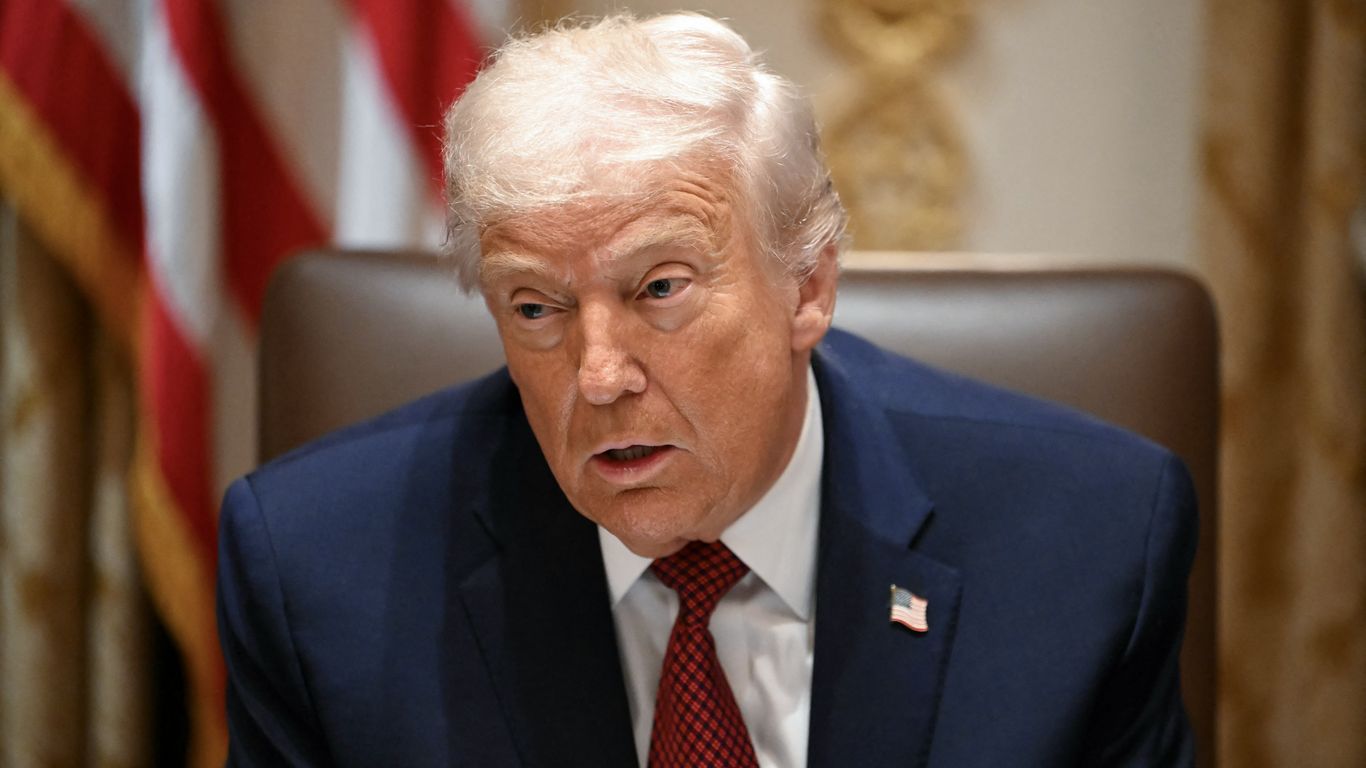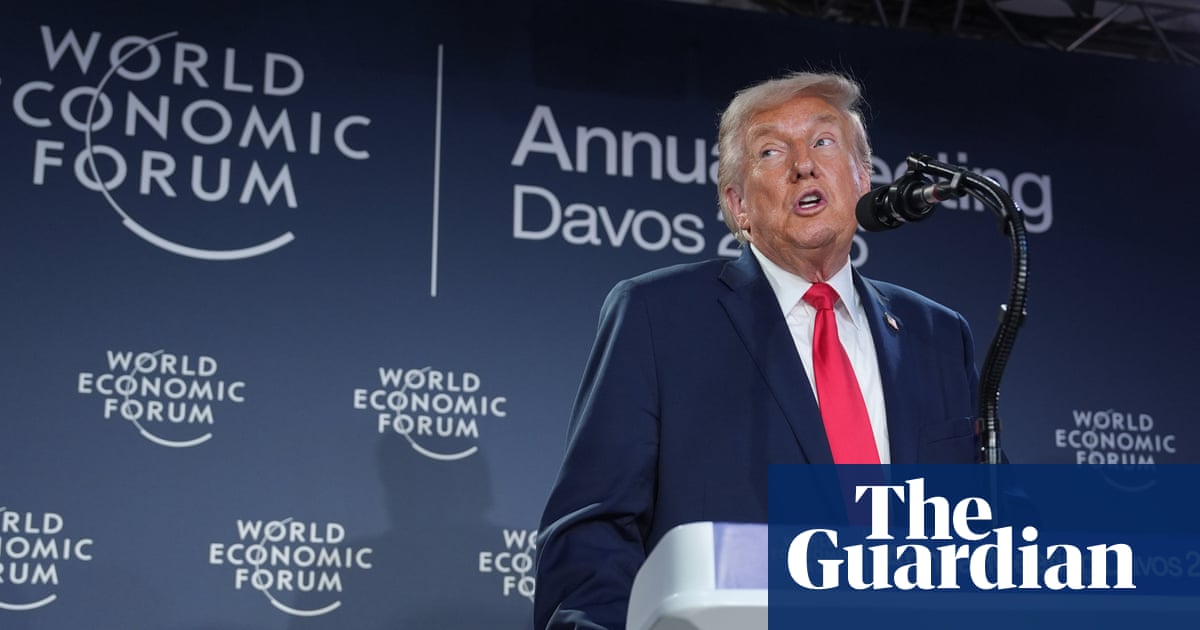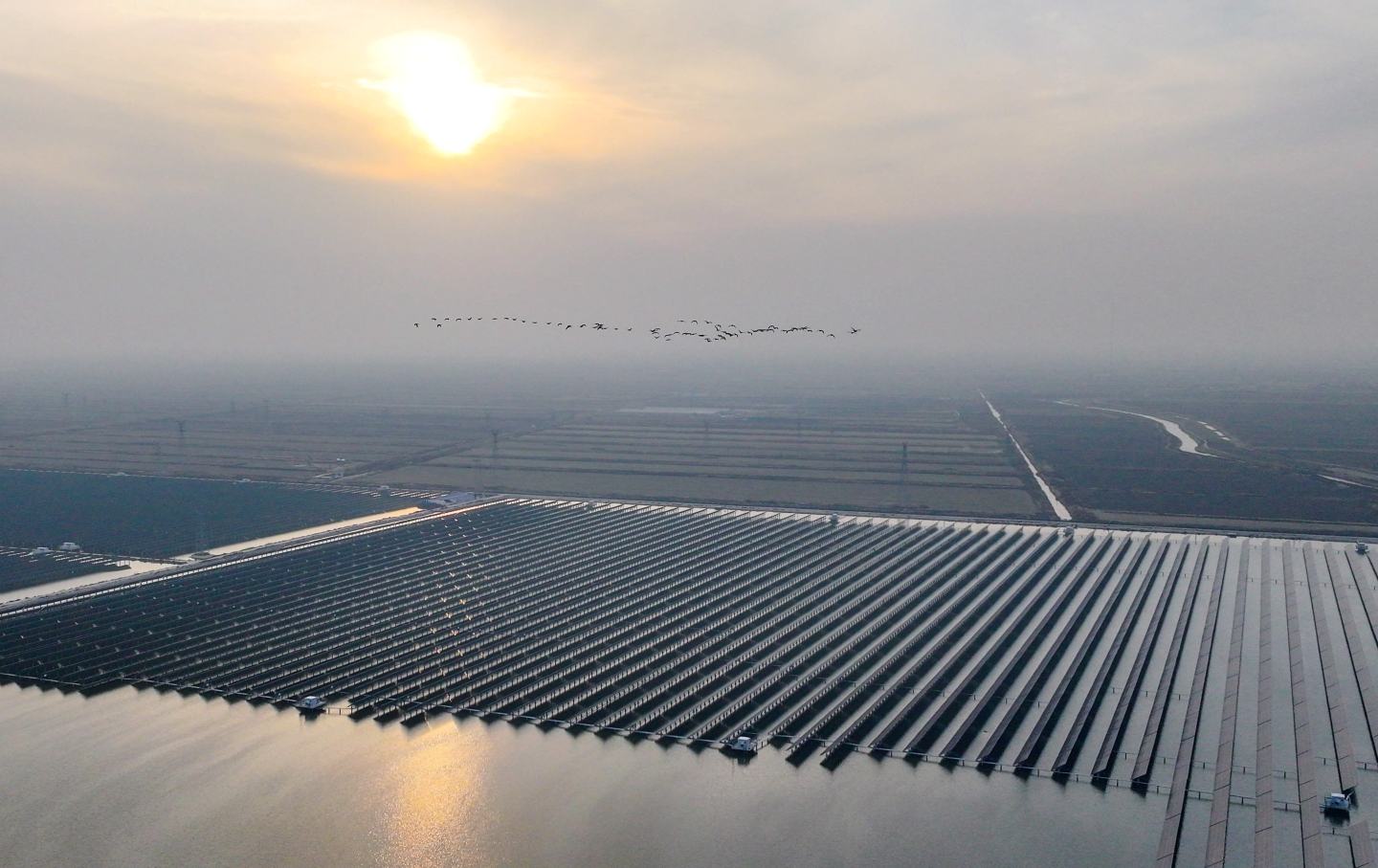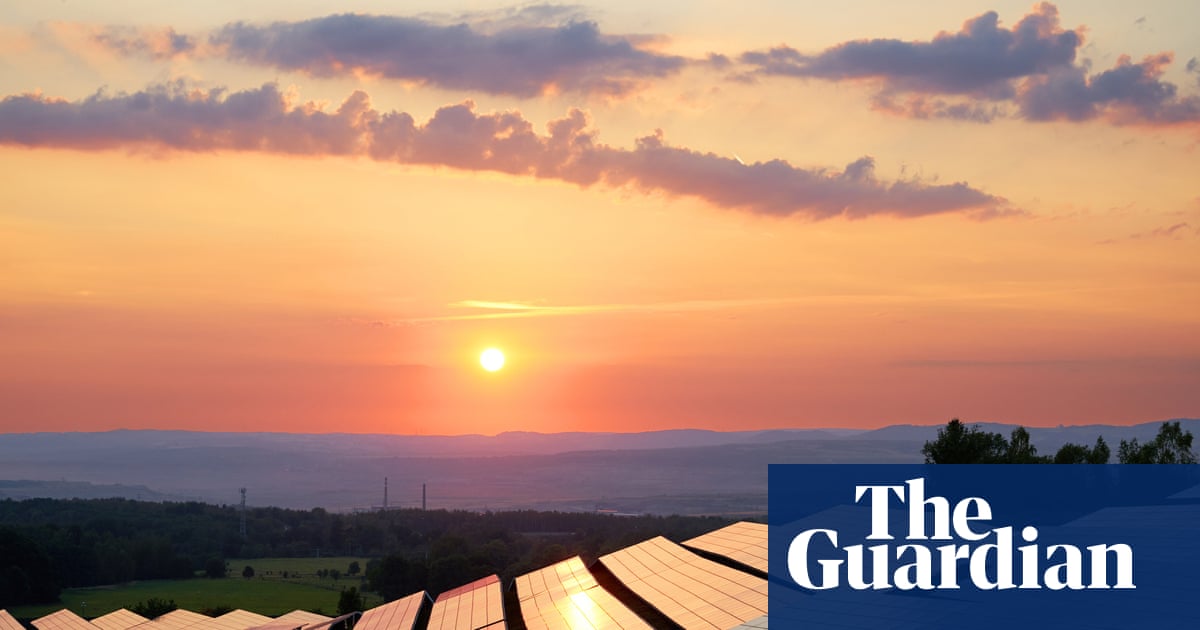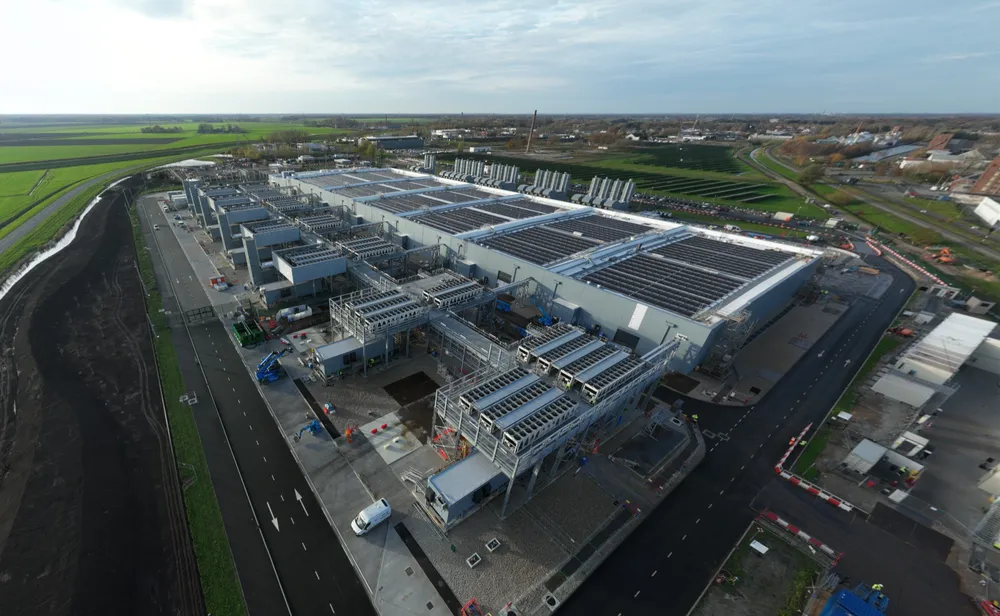#renewable-energy
#renewable-energy
[ follow ]
#energy-policy #offshore-wind #solar-power #energy-storage #sustainability #paris-agreement #electricity-prices
fromwww.theguardian.com
18 hours agoThe lithium boom: could a disused quarry bring riches to Cornwall?
It looks more like the past than the future. A vast chasm scooped out of a scarred landscape, this is a Cornwall the summer holidaymakers don't see: a former china clay pit near St Austell called Trelavour. I'm standing at the edge of the pit looking down with the man who says his plans for it will help the UK's transition to renewable energy and bring back year-round jobs and prosperity to a part of the country that badly needs both.
Environment
fromenglish.elpais.com
3 days agoWhat Trump can't stop: Renewable energy is growing and setting world records
In his disjointed speech at the World Economic Forum in Switzerland, Donald Trump once again lashed out against renewable forms of energy, the European Union and its Green Deal, which aims to transform the energy and mobility system to break dependence on fossil fuels, the main cause of climate change. Trump, like the European far-right, dismissed the accord, calling it a Green New Scam. But the truth is that, despite his attacks, renewables continued to grow in 2025 and set records, while fossil fuel consumption for electricity generation stagnated.
World news
fromBusiness Matters
5 days agoOctopus Energy strikes major China joint venture during PM visit
The deal was announced during Keir Starmer's official visit to China, with Octopus founder and chief executive Greg Jackson joining the UK business delegation in Beijing. The new venture, called Bitong Energy, will combine PCG Power's position as one of China's fastest-growing investors and solutions providers in the commercial and industrial renewable energy sector with Octopus' proprietary software and expertise in green energy trading and optimisation.
Venture
fromBerlin Startup Jobs
1 week agoJob Vacancy: Senior Software Engineer (Backend) (m/w/d) - Team Billing // Lumenaza GmbH | IT / Software Development Jobs | Berlin Startup Jobs
We are a green-tech company shaping the energy industry towards a more sustainable future. At Lumenaza, you have the opportunity to actively contribute to the world of decentralized and renewable energy. Our mission is to drive the energy transition forward - with passion and innovation. Lumenaza stands for clear values: sustainability, diversity, and collaboration. We take pride in our diverse team and are committed to supporting women in tech.
Software development
Environment
fromTravel + Leisure
6 days agoThis Coastal City Was Just Named the 'Greenest' in the World-and It's an Eco-friendly Dream for Nature-loving Travelers
Vancouver ranks as the world's most eco-friendly city due to abundant green space, high renewable energy use, clean air, efficient public transportation, and strong bikeability.
fromArchDaily
1 week agoFoster + Partners Plans Airport-Led Urban Development Outside Luanda, Angola
Foster + Partners, in collaboration with Angola's Ministry of Transport, has unveiled the master plan for the Icolo e Bengo Aerotropolis, a large-scale development planned around the recently completed Dr. Antonio Agostinho Neto International Airport. The proposal organizes business, research, residential, and hospitality programs within a landscape-led framework structured around the airport. Development is planned to proceed in phases, beginning with the business and cultural district located to the north of the site.
World news
fromYanko Design - Modern Industrial Design News
2 weeks agoThis Silent Wind Turbine Solves Sailing's Power Problem - Yanko Design
There's something romantic about sailboats that still speaks to us in this hyper-connected age. The idea that you can harness nothing but wind and water to glide across the ocean feels almost magical. But here's the reality check: even the most old-school sailor needs power these days. Your GPS has to stay on, your radar needs juice, those navigation lights aren't optional, and let's be honest, nobody wants to lose their phone charge mid-voyage.
Gadgets
California
fromThe Mercury News
3 weeks agoLetters: If polluters paid for damage, state's deficit would be less
Fossil fuel companies should be held financially responsible for climate-driven damages to reduce taxpayer burdens and accelerate the transition to renewable electricity and all-electric buildings and vehicles.
fromState of the Planet
4 weeks agoClimate Action Costs More in the Global South. Here's Why.
Clean energy technologies have become more affordable around the world. Yet for many countries in the Global South, the cost of transitioning to a low-carbon economy remains disproportionately high. But not because the equipment is more expensive: in fact, solar and wind components are often imported at comparable prices around the world, as global manufacturing scale and trade have helped standardize hardware costs. Instead, the disparities in financing costs reflect the way the global financial system fails to adequately capture, differentiate and price risk.
Environment
fromThe Local Germany
4 weeks agoGermany's energy transition put on the back burner in 2025
The share of renewables in German power production almost stagnated in 2025, data showed Monday, as concerns grow about a shift away from green policies under conservative Chancellor Friedrich Merz. The figure had increased strongly in previous years as Europe's biggest economy aims to reach a goal of green power accounting for 80 percent of its energy mix by 2030.
Environment
fromwww.npr.org
1 month agoClean energy is surging despite political attacks. But a slowdown may be looming
The administration has used federal agencies to try to slow or stop the development of wind and solar projects. And this summer, the GOP-controlled Congress voted to get rid of tax credits for renewable energy, threatening to drive up the cost of projects. As a result of those moves, the United States is forecast to add a lot less power from renewables in the coming years than analysts previously expected, according to the International Energy Agency.
US politics
fromZDNET
1 month agoDo wind power generators actually work at home? I tested one, and the results blew me away
Follow ZDNET: Add us as a preferred source on Google. I cover a lot of solar generators here, and they are all the rage. I've tested dozens of devices over the past few years and seen the technology go from strength to strength. But I often get asked, "What happens when the clouds roll in, and the sun vanishes?" Living in the UK, the sun can be in short supply for much of the year.
Gadgets
California
fromwww.theguardian.com
1 month agoThe biggest transformation in a century': how California remade itself as a clean energy powerhouse
California is rapidly expanding renewable energy and battery storage, reducing natural gas use and positioning itself as a de facto national and global climate leader.
fromArs Technica
1 month agoHow Europe's new carbon tax on imported goods will change global trade
Around the world, CBAM has faced strong criticism. India and China describe it as "green protectionism," arguing that it puts unfair pressure on developing economies. At the same time, the EU has not yet created dedicated funding to help exporters in lower-income countries adapt. Without this support, the mechanism may not achieve the desired results. What about consumers? Although CBAM is mainly aimed at industry, its ripple effects will reach consumers in the EU.
Environment
fromFuturism
1 month agoGermany Building Clever System to Heat 40,000 Homes Using Device Powered by River Water
The Rhine is the second-longest river in Western Europe, discharging about 100,000 cubic feet of water a second into the North Sea. It snakes through the Swiss Alps and makes up large sections of Germany's western border with France, spreading out across a major delta in the Netherlands before emptying into the ocean. It's also an enormous, largely untapped resource for clean power.
Environment
fromwww.aljazeera.com
1 month agoNorway's green transition is putting Sami culture at risk
I grew up in a small place called Tana, where there were just 12 children in my school class. Of the five of us who were Sami, two came from families of reindeer herders. At the time, I believed the rest were Norwegian. Later, I learned that everyone in my class was Sami. Their parents had been pressured to hide who they were.
Miscellaneous
US politics
fromEarth911
1 month agoClassic Podcast: Historian Jay Hakes on the 1970s Energy Crises' Link to Climate Policy Today
1970s energy crises reshaped U.S. energy policy, prompting early renewable investments and influencing decades of oil-focused choices and later renewed shifts toward energy independence.
fromKqed
1 month agoCalifornia Lowers Climate Pollution by 3%, Report Finds | KQED
California's planet-warming pollution shrank by 3% in 2023, one of the largest year-over-year reductions the state has seen, according to a report by nonprofit Next 10. The state's use of cleaner fuels in heavy-duty transportation, like big rigs, and its deployment of battery storage and solar energy drove this climate progress, in large part. While the transportation sector comprised the state's largest category of emissions, accounting for roughly 38% of emissions in 2023, it also saw the largest percentage decrease in emissions of any other sector, falling by 4.6%.
Environment
Business
from24/7 Wall St.
1 month agoThis Nuclear Play Trades at 61% Premium Despite Earnings Falling 22% This Quarter
Constellation focuses on nuclear expansion with premium valuation tied to hyperscaler demand, while NextEra offers diversified, regulated utility cash flows funding renewables growth.
Environment
fromFortune
1 month agoExelon CEO: The 'warning lights are on' for U.S. elecgrid resilience and utility prices amid AI demand surge | Fortune
Immediate investment in diverse power generation and efficiency upgrades is required to prevent grid failures and curb soaring utility bills amid rising AI-driven demand and electrification.
fromwww.theguardian.com
1 month agoUS judge strikes down Trump order blocking wind energy projects
A federal judge on Monday struck down Donald Trump's executive order blocking wind energy projects, saying the effort to halt virtually all leasing of windfarms on federal lands and waters was arbitrary and capricious and violated US law. Judge Patti Saris of the US district court for the district of Massachusetts vacated Trump's 20 January executive order blocking wind energy projects and declared it unlawful.
US politics
fromTheregister
1 month agoMeta and Google tap NextEra to feed their hungry datacenters
NextEra Energy on Monday tightened its grip on hyperscaler power demand, adding 2.5 GW of new renewable projects for Meta while deepening its partnership with Google, which already covers about 3.5 GW of capacity. Taken together, Meta and Google now touch roughly 18 percent of the 33.4 GW of generating capacity in operation at NextEra Energy's subsidiary, NextEra Energy Resources, underscoring both the growing appetite for datacenter power and the consolidation of supply among hyperscale customers.
Marketing
fromHomebuilding
1 month agoFloating solar panels heading to the UK
(Image credit: Getty Images) Floating solar panels are a growing trend around the world, and the UK seems to be cottoning on to their potential. The government has just approved the largest floating solar panel project in Barrow in an attempt to generate cheap energy. The project promises to solve one of the biggest problems with large-scale solar projects, the amount of land that they take up, meaning solar panels could become even more viable across the UK.
Environment
fromwww.scientificamerican.com
2 months agoChina's CO2 Emissions Might Have Finally Peaked
China's carbon dioxide emissions have plateaued in 2025, indicating the country may have reached a peak after years of being the world's top emitter. The plateau reflects how China's record-setting build-out of wind and solar power and rapid expansion into electric vehicles has tempered fossil-fuel emissions, according to the nonprofit Center for Research on Energy and Clean Air. China accounts for around one third of all global greenhouse gas emissions, although historically the U.S. has emitted more carbon.
Environment
fromenglish.elpais.com
2 months agoTikTok's first data center in Latin America will be in Brazil and will run entirely on wind power
TikTok, one of the world's most popular social media platforms, announced Wednesday that it will build its first data center in Latin America in Brazil, near the city of Fortaleza. The project represents a $38 billion investment. The Chinese company's supercomputers, which have revolutionized the internet with their short videos that are followed by hundreds of millions of users, will be operational in 2027 and will be powered exclusively by 100% renewable energy, according to a TikTok statement.
World news
fromwww.aljazeera.com
2 months agoWestern Cuba faces blackout as government seeks to update energy grid
For hours, millions of residents remained in the dark as the government worked to restore power to an area that spans from the westernmost province of Pinar del Rio to Mayabeque, just east of Havana. Throughout the morning, officials sought to reassure the public that electricity would soon be restored. Following the power outage in western Cuba, the workers at [the Ministry of Energy and Mines] immediately began restoration efforts, which are already under way,
World news
fromBitcoin Magazine
2 months agoHow Trash In Colombia Is Now Mining Bitcoin Cheaper Than Anywhere In America
Colombian Bitcoin and crypto mining company Horeb Energy reveals 2.5 cents per kWh of green biogas energy in the North Santander region of the Latin American country. The company has achieved energy prices 50% lower than the North American average of 3.5 to 6 cents per kwh for Bitcoin mining operations, through a strategic alliance with multinational energy company Veolia. Authorized in 1853 by Napoleon III to help build out public water works infrastructure in France, Veolia is a global leader in environmental services focused on water, waste, and energy solutions. Today in Norte de Santander, Colombia, the company operates critical facilities dedicated to biogas valorization and solid waste management - a common problem in Colombia and Latin America in general, known for massive landfills. Veloia also operates the "Centro Inteligente de Gestión Ecológica" - CIGE Guayabal landfill, a pioneer in biogas systems development in the region.
Environment
US politics
fromArs Technica
2 months ago"Renewable" no more: Trump admin renames the National Renewable Energy Laboratory
The National Renewable Energy Laboratory renamed National Laboratory of the Rockies reflects a federal shift toward broader energy priorities and deemphasis of renewable-focused research.
UK news
fromLondon Business News | Londonlovesbusiness.com
2 months agoInvesting in the UK in 2026: Orb Strategies reviews possible venues - London Business News | Londonlovesbusiness.com
UK investment focus will likely shift toward undervalued equities, renewable energy projects, technology/fintech growth, and alternative assets amid ongoing political and trade uncertainties.
Artificial intelligence
fromHarvard Business Review
2 months agoHow Data Centers Can Support Energy Resiliency While Managing AI Demand - SPONSOR CONTENT FROM SCHNEIDER ELECTRIC
AI-driven data center growth is rapidly increasing electricity demand, straining grids and requiring major investments, renewable capacity, and new utility models.
fromFast Company
2 months agoWhy renewable energy isn't replacing fossil fuels faster
A decade ago, the cheapest way to meet growing demand for electricity was to build more coal or natural gas power plants. Not anymore. Solar and wind power aren't just better for the climate; they're also less expensive today than fossil fuels at utility scale, and they're less harmful to people's health. Yet renewable energy projects face headwinds, including in the world's fast-growing developing countries.
Environment
fromThe New Yorker
2 months agoWhy the Time Has Finally Come for Geothermal Energy
When I arrived in Reykjavík, Iceland, last March, a gravel barrier, almost thirty feet at its highest point, had been constructed to keep lava from the Reykjanes volcano from inundating a major geothermal power station not far from downtown. So far, it had worked, but daily volcano forecasts were being broadcast on a small television at the domestic airport where I was waiting to take a short flight to Akureyri.
Environment
fromwww.theguardian.com
2 months ago$170,000 a minute: why Saudi Arabia is the biggest blocker of climate action
Can you imagine someone giving you $170,000 (129,000)? What would you buy? Can you imagine getting another $170,000 one minute later? And the handouts then continuing every minute for years? If so, you have a feel for the colossal cash machine that is Saudi Arabia's state oil company Aramco, the world's biggest producer of oil and gas last year. That tidal wave of cash keeps the authoritarian kingdom afloat,
Environment
[ Load more ]




